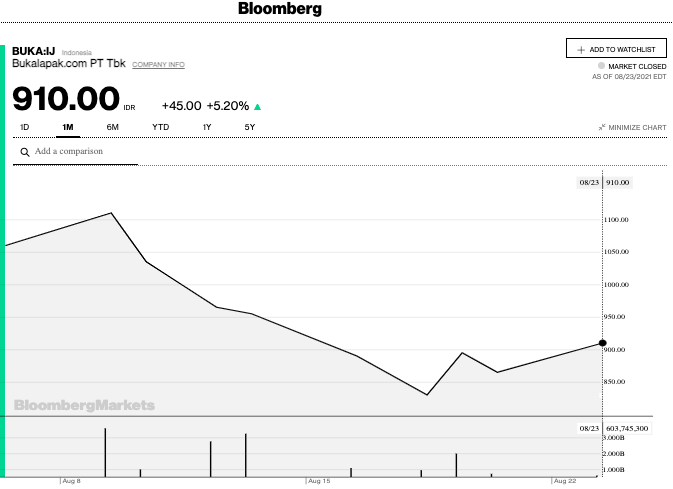There have been many reasons for Indonesia’s millennials and Gen Z to begin investing in new financial instruments and assets this year. One popular tech company, Bukalapak, had its IPO on the Indonesia Stock Exchange, or IDX, in early August, and GoTo has the same plan in the foreseeable future. But for new investors who do not have firsthand knowledge about the stock market’s inherent risks, volatility breeds anxiety and uncertainty, especially when reality doesn’t match expectations.
Bukalapak debuted on the IDX on August 6 with a promising outlook. The firm was the subject of intense interest from domestic and international investors during its book-building process and roadshow, and the company hiked its share allocation for retail investors from 2.5% to 5% of the total available orders. Bukalapak’s shares soared 25% on the first day of trading as investors were eager to get a piece of the e-commerce unicorn.
Then, on day three, the value of Bukalapk’s shares fell 6.76%, hitting the bourse’s limit for one-day drops, as early investors sought exits. The slide continued for more than a week.

The plummeting share price caused disappointment among retail investors, many of whom had rosy expectations for solid short-term gains. Some took to social media to air their complaints, and others left one-star reviews for Bukalapak’s app on the Google Play store to indicate their disappointment in the company’s performance on the IDX. Bukalapak quickly responded to users’ protests by saying that the stock movement was purely a market mechanism.
The reactions reflect how financial literacy is out of sync with the self-guided investment options that are available to the general public. “Many retail investors don’t seem to understand how to choose stocks that are suitable for them. Foreign investors and institutions sold off their shares after mulling a number of considerations, which are based on the value of the company,” said Fahmi Arya, CEO of digital investment platform Raiz Invest Indonesia. Arya indicated that retail investors may not have access to the same information available to institutional investors, leading to divergent decision-making processes.
He added that investors should pay attention to the company’s fundamentals before investing. “Retail investors’ considerations are certainly different from institutions, which usually invest in unprofitable companies for the potential of long-term synergies,” said Arya.

Harry Hartono, CEO of online investment app Fundtastic, shares this sentiment. “As we see the recent growth in the number of investors in Indonesia, we also need to encourage the growth of financial literacy. I always urge investors to be more observant and cautious when choosing investment products, so they are not tempted to do impulse trading due to momentary trends or hype,” he told KrASIA.
For novice investors, buying mutual funds could be a safer option as they are guided by fund managers who perform fundamental analysis and due diligence. “If you want to invest in a single stock, you need to analyze the valuation promises offered during the roadshow, especially for tech companies that are relatively new to the Indonesia Stock Exchange,” said Hartono.
Arya sees investors’ reactions to Bukalapak’s sharp stock movements as a lesson for firms that are planning to go public. “Companies should prepare for this phenomenon since the beginning. They should provide adequate education for the public, and avoid anything related to promoting investments in their companies,” he said.
He added that government agencies and industry players must prioritize education over the growth in the number of investors. “I personally urge new retail investors to try some safe and low-risk instruments, such as bond investments or mutual funds, before entering stocks directly. This way, investors will gain the basic knowledge of investing, and they’ll be ready to face higher risks,” said Arya.
Read this: As investments become in vogue in Indonesia, ethically questionable promotions blanket social media
